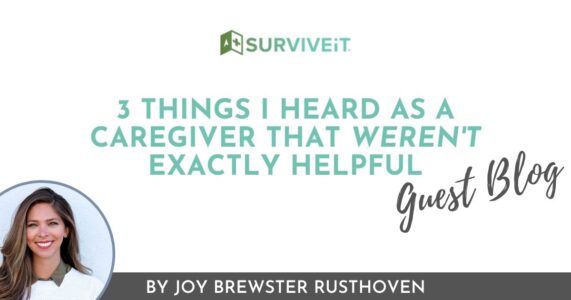3 Things I Heard As A Caregiver That Weren’t Exactly Helpful

Allow me to preface my opinions on the fact that none of these were said to me with ill-intent. I know that people generally don’t know better. That’s why this series is so important.
1. “How long does he have?”
I actually never “Googled” my Dad’s prognosis. I didn’t want to know. It wouldn’t have impacted how we faced his cancer. Once he was enrolled in hospice, that was enough of a reality check for me. It felt like people knew something I didn’t or that just because he had a cancer diagnosis it was inevitable. That was a horrible feeling that deflated me every time I was asked it. Please don’t ever take away a patient or caregiver’s hope. That is not your place. 🙂
2. “I’m sorry he lost his battle with cancer.”
This should just never be uttered – for many reasons. Let’s replace this with a simple, “I’m so sorry for your loss.” While I’m not against calling it a “battle” with cancer like some, I don’t believe people “lose” anything to cancer. It is usually fought bravely and so much physically, emotionally, and mentally is endured. Some choose to forego treatment completely, and that is their right. Whatever the patient chooses should be supported. It’s their life. Because of my beliefs, I believe my Dad conquered this horrible disease and is in a far better place – where there is no suffering.
3. “You should do _______. I heard it can help.”
If I had a dime for every time someone suggested an herb or diet to cure my Dad’s cancer…
A good rule of thumb is to withhold opinions or suggestions unless the patient or caregiver asks you. We have enough decisions and things to manage on our plates that we don’t usually have time to consider or research every piece of advice that comes our way. We appreciate the thought and you wanting to help, but listening is always a safe bet. If you feel so strongly that there is information you must impart, you can ask!
Here’s a suggestion: “I know you are going through so much and have a lot on your plate. May I share something I found/something my (insert relationship here) found to be crucial when they were facing cancer?” Just know, the answer might be no. And that’s ok.
Resources for Caregivers
There are many facets to cancer caregiving. We want to do everything we can to support you in your role as a cancer caregiver.
As cancer survivors, caregivers and medical professionals, we built our Cancer Navigation Tool for people just like you. It’s a 5-step personalized planning tool that can help you determine which path is the best path for your loved one, along with some guidance in moving through the process. Use our tool to take action around your loved one’s treatment plan. We’ve done the research for you so you can also use it to find second opinions, resources on symptom management, and more. Last, you can find support for both you and your loved one for the many areas of your life that is impacted by cancer.
By using this tool, we hope you get peace of mind that you’re effectively advocating and caring for your loved one.

Joy Brewster Rusthoven, Executive Director
